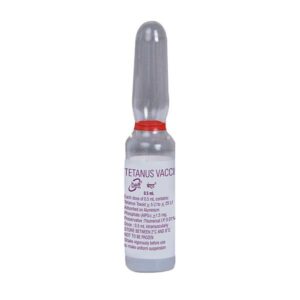TETANUS TOXOID
TETANUS TOXOID: TETANUS TOXOID is a vaccine used to prevent tetanus, a serious bacterial infection. It is commonly given as part of the routine childhood immunization schedule and may also be given to adults who have not previously received the vaccine or those who require a booster dose.
The mechanism of action of the tetanus toxoid vaccine involves the induction of an immune response against the tetanus toxin produced by the bacteria Clostridium tetani. The vaccine contains an inactivated form of the tetanus toxin, which stimulates the production of specific antibodies (known as tetanus antitoxin) that can neutralize the toxin. These antibodies help provide passive immunity and protect against future tetanus infections.
The standard dose and schedule for tetanus toxoid vaccination vary depending on the age and previous vaccination history of the individual. In children, a series of five doses are typically administered, with the first dose given at 2 months of age, followed by additional doses at 4, 6, and 12-18 months, and a final dose between 4-6 years of age. Booster doses are recommended every 10 years to maintain immunity.
Tetanus toxoid vaccines are generally well-tolerated, with minimal side effects. Common side effects include pain, swelling, or redness at the injection site. Low-grade fever, headache, and muscle aches may also occur. Serious side effects are rare but may include severe allergic reactions or neurological problems such as dizziness, numbness, or tingling.
It is important to note that the tetanus toxoid vaccine does not provide immediate immunity. It takes several weeks to develop protective antibodies, so it is crucial to receive the vaccine well in advance of potential exposure to tetanus.

